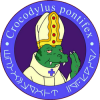Edited by Delight, 21 May 2006 - 07:58 AM.

What Ability Ranks Mean
#21

Posted 21 May 2006 - 07:58 AM
#22

Posted 22 May 2006 - 06:33 AM
This is simply my muddled understanding though; you'll need someone who actually has a better handle on gods and/or rulebooks for a definitive answer.
Why is this Hypnotoad video so popu... ALL GLORY TO THE HYPNOTOAD.
____
The Gibberlings Three - Home of IE Mods
The BG2 Fixpack - All the fixes of Baldurdash, plus a few hundred more. Now available, with more fixes being added in every release.
#23

Posted 22 May 2006 - 10:58 AM
I believe in the context of (A)D&D, a demigod is simply a lesser god, not someone who has divine lineage. At the conclusion of ToB the PC can ascend to demigodhood, I believe.
This is simply my muddled understanding though; you'll need someone who actually has a better handle on gods and/or rulebooks for a definitive answer.
Is there an intermediate level between mortals and demigods other than Chosen?
"Tyranny is a quiet thing at first, a prim and proper lady pursing her lips and shaking her head disapprovingly, asking, well what were you doing (wearing that dress, walking home at that hour, expressing those inappropriate thoughts) anyway? It's subtle and insidious, disguised as reasonable precautions which become more and more oppressive over time, until our lives are defined by the things we must avoid. She's easy enough to agree with, after all, she's only trying to help -- and yet she's one of the most dangerous influences we face, because if she prevails, it puts the raping, robbing, axe-wielding madmen of the world in complete control. Eventually they'll barely need to wield a thing, all they'll have to do is leer menacingly and we fall all over ourselves trying to placate them." -godlizard
#24

Posted 22 May 2006 - 11:08 AM
#25

Posted 22 May 2006 - 11:50 AM
In the beginning the Universe was created. This has made a lot of people very angry and been widely regarded as a bad move - Douglas Adams
I like persons better than principles, and I like persons with no principles better than anything else in the world - Oscar Wilde
Give a man a fire, and he's warm for a day. But set a man on fire, and he's warm for the rest of his life. - Terry Pratchett
#26

Posted 22 May 2006 - 02:23 PM
- The transitioned former modder once known as MTS.
#27

Posted 22 May 2006 - 04:35 PM
I believe in the context of (A)D&D, a demigod is simply a lesser god, not someone who has divine lineage. At the conclusion of ToB the PC can ascend to demigodhood, I believe.
I dunno; the way the end movie describes it, it sounds like the PC is reaching a little more than just the lowest divine rank... *ponders* Bhaal was an intermediate power, so it logically follows that if the PC gained his power (all of it) then the PC would be at about the same rank...of course, this being religion, following logically doesn't count for much. ;/
What about mang0s?
Bah, forget mang0s. Now, womang0s, on the other hand... ^.^
Edited by Azkyroth, 22 May 2006 - 04:42 PM.
"Tyranny is a quiet thing at first, a prim and proper lady pursing her lips and shaking her head disapprovingly, asking, well what were you doing (wearing that dress, walking home at that hour, expressing those inappropriate thoughts) anyway? It's subtle and insidious, disguised as reasonable precautions which become more and more oppressive over time, until our lives are defined by the things we must avoid. She's easy enough to agree with, after all, she's only trying to help -- and yet she's one of the most dangerous influences we face, because if she prevails, it puts the raping, robbing, axe-wielding madmen of the world in complete control. Eventually they'll barely need to wield a thing, all they'll have to do is leer menacingly and we fall all over ourselves trying to placate them." -godlizard
#28

Posted 23 May 2006 - 10:32 PM
I believe in the context of (A)D&D, a demigod is simply a lesser god, not someone who has divine lineage. At the conclusion of ToB the PC can ascend to demigodhood, I believe.
This is simply my muddled understanding though; you'll need someone who actually has a better handle on gods and/or rulebooks for a definitive answer.
I believe D&D sort of takes the classic mythology view of a diety status determination.
1) The DM gets to decide
2) A demigod is either a non-widely worshipped god, or the offspring of a mortal and a god. The particular power level of the demi-god is typcially determined by parentage...the son/daughter/offspring of a greater/elder god is going to be more powerful than the son/daughter/offspring of a lesser god. See Hercules son of Zeus
3) In rare instances a mortal can ascend directly to demigod status - See Yama - Indian God of Death
4) Occasionally mortals become so powerful or they are such pillars of their faith that they can become paragons (e.g. Paragon of Virtue for a good mortal or Mr. Despicable for an evil mortal...that last part was a joke
5) Slaying a god and taking their mantle might be enough in certain instances, although no guarantees that you immediately ascend to the same power/status level...you might have to start from the bottom. See Cyric Forgotten Realms
6) Or their is Dragonlance, where anyone over 18th level got kicked off Krynn by the gods (at least I recall something to that effect).
7) Having certain artifacts in your possesion might also lend a mortal the equivalent of demigod or greater status, especially if the item allows to commune/channel a dieties's power.
I think the Basic D&D sets (I'm thinking the green books, with the Knight weilding a two handed sword while facing a dragon?) had some more info about how a mortal might become a deity in the scope of D&D
Edited by cirerrek, 23 May 2006 - 10:35 PM.
#29

Posted 24 May 2006 - 10:31 AM
7) Having certain artifacts in your possesion might also lend a mortal the equivalent of demigod or greater status, especially if the item allows to commune/channel a dieties's power.
Anyone have more info on this one?
"Tyranny is a quiet thing at first, a prim and proper lady pursing her lips and shaking her head disapprovingly, asking, well what were you doing (wearing that dress, walking home at that hour, expressing those inappropriate thoughts) anyway? It's subtle and insidious, disguised as reasonable precautions which become more and more oppressive over time, until our lives are defined by the things we must avoid. She's easy enough to agree with, after all, she's only trying to help -- and yet she's one of the most dangerous influences we face, because if she prevails, it puts the raping, robbing, axe-wielding madmen of the world in complete control. Eventually they'll barely need to wield a thing, all they'll have to do is leer menacingly and we fall all over ourselves trying to placate them." -godlizard
#30

Posted 09 July 2006 - 12:44 AM
I dont remember the set talking much about PCs being transformed into actual gods themselves, but its been a long long time. Think I still have all of the original sets buried in storage somewhere.
Also iirc, ascension into the immortal realm wasnt instant in that ruleset. Usually immortal status was granted after a long and arduous quest of some sort only given once the PC had reached some notible status of power/performed certain deeds/quests.
Aside from that the term *god* usually implys worship of some kind. Certainly PCs could be consided godlike in terms of power, of course it doesnt mean they are or should be demigods (or have demigod stats).
Also concerning AD&D (pre 3rd edition anyways) and the killing a god to take their power - the gods material forms were usually what was encountered, not the actual essence of the god itself, which dwelt usually on their own (or related) plane. Where of course they were immensely more powerful then whatever material form a party usually encountered. Killing a gods real form on its own plane would be nigh impossible in such a context by any group of godly PCs.
Disclaimer! Not too sure on that info been like 10 years (or more) since I looked at that stuff (and yes im an old DM, not a modder).
At the end of ToB the main character is given a choice between entering the godly realm as the embodiment of Bhaals power, or staying in the mortals realms. The 1st choice catapults the PC directly into demigodhood, and I guess its a fitting ending. But to me it seemed a bit too easy cut concept wise. Yer a god, the end, sorta thing.
(yay for tangents)
Playing BG I find that I like having an 18 in the prime requisite ability score for my own generated characters (along with high constitution and dex), but I see no reason to have pcs/npcs with innate ability scores over 19, at all. Being someone that doesnt mod or use cheats I have rolled my PCs from scatch. Very rarely have I ever seen ability score totals over 90 (rolled 92 for the gd bard lately tho, wtf, only time I have seen a randomly generated score that high), but landing in the mid to high 80s gives you a very playable character if not a superb one. And as I dont use cheats and such my PCs have never had ability scores into the 20s (except str from various items), and I cant say that I want them to (well, besides str). I think it would detract from the overall fun to run around with a bunch of characters with scores into the 20s, once they start hitting 19-20 they have a massive effect on encounters already. To me balance = enjoyability. When things get too easy I loose interest.
**edit: just finished playing BG1 TotSC for the first time, well, took a couple of runs (and installs) to finish so had a couple of characters getting ability raising books/scrolls that took scores above 19. And yes it is still fun having these PCs with high ability scores but I still dislike the thought of giving starting characters innate scores above 19. Also it gives something for the player to shoot for in raising ability scores into the 20s, and seeing the differences as the PCs develope is $$$.
As a DM I actually had to modify hps on some of my unique monsters during encounters after letting a party acquire a girdle of giant strength (cant remember which one) too early. The change in damage output from the str bonus was just too big and they were slaughtering monsters with ease that should have been challenging to them. Just a few points can make a huge difference in outcomes.
Edited by zachD, 16 July 2006 - 11:11 PM.
#31

Posted 24 July 2006 - 06:50 AM
Um - Poppycock! The D&D stats are based on the random probability of 3d6.00. - Not applicable to the character.
01. - So low as to be almost unmeasurable.
02. - Below human minimum.
03. - Functional human minimum.
04. - Impaired in a major fashion.
05. - Impaired in a minor fashion.
06. - Well below human average.
07. - Below human average.
08. - Low human average.
09. - Human average.
10. - Human average.
11. - High human average.
12. - Above human average.
13. - Well above human average.
14. - Among the best in the village.
15. - Among the best in the city.
16. - Among the best in the region.
17. - Among the best in the nation.
18. - Among the best in the world.
19. - Beyond the limits of normal man.
20. - Beyond the limits of heroic man.
21. - Surpassing superhuman levels.
22. - The equal of the demigods.
23. - The equal of the lesser gods.
24. - The equal of the gods.
25. - The equal of the greater gods.
First: A stadard deviation on 3d6 puts the first deviation from 8 to 13; that is, an INT 8 is equal to an IQ of 85, an INT 13 is an IQ of 115. Hardly spectacular.
The second deviation, going out to encompass 95% of the typical, reaches to 5 and 16; that is, an INT 5 is about IQ 68; and an INT 16 is about IQ 132. This is unusual, and a very effective level.
The third deviation, that is all but 0.3%, takes us to 3 and 18; that is, 17-18 INT represents all the people from about 132 IQ to about 150. 18 is one in 200 odd, which would be 5 or so in a town of 1000.
About one in a 30,000 will be in the 4th deviation, which would be the 2 and 19.
Now, of course, when you start to say that your character has 18 DEX, 18 CON and 18 WIS, then you're looking at a one in 10 million person. of course, in elves, that one in 10 million would be 19 dex, 17 con, 18 wis, and because the minimum's are higher, there's a corresponding lessening of the rarity.
Anyway, my point is that 9-12 is completely and typically average, 8 and 13 are slightly unusual, and 14-16 is slightly uncommon. Someone with 14-16 in ALL stats would be about one in 340! This is your high school letterman, freinds. America has a million of them.
Someone with a single 18 and 2 17s, and nothing below 9? That's only one in 2.7 million.
Someone with an 18 and every other stat from 14-16? One in 3.5 million. And that's a stat range of from 88 to 98.
This isn't rocket science, it's simple statistics.
#32

Posted 24 July 2006 - 11:07 AM
- Yahtzee
#33

Posted 17 August 2006 - 06:17 AM
For the point you made, Cyric would be a bad example. After all, when he killed Bhaal/Myrkul he got catapulted into the upper regions of godhood and got strong enough to even kick Ao in the shins for one instance. (Does negating a light trick count as shin-kicking?)5) Slaying a god and taking their mantle might be enough in certain instances, although no guarantees that you immediately ascend to the same power/status level...you might have to start from the bottom. See Cyric Forgotten Realms














